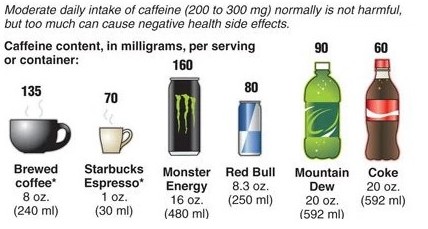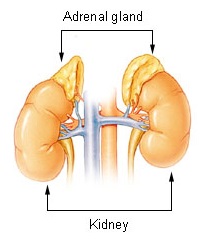

Not having enough energy is a sign of diminished health. You may need help in figuring out what underlying problems are causing your fatigue.
So, if you are suffering from severe fatigue, be sure to consult with a medical doctor to make sure you don't have a serious health problem affecting your energy level.
Fatigue may be the result of one of the following:
If you don't have a serious health issue (above), read futher below.

|
|
|
|
Understanding Energy
To understand how we can get more energy, we need to understand how the body produces energy. Food is the fuel that contains potential energy for the body. But eating more food doesn't give you more energy because the food has to be converted to energy through the process of digestion and metabolism. If more fuel is consumed than can be converted to energy, the body simply stores it as fat. And, although fat is sometimes referred to as an 'energy reserve,' it is actually a 'fuel' reserve. Metabolism is what converts the (healthy) food we consume into energy. That energy comes in the form of heat and electricity. The body is constantly dissipating heat, but it stores electrical energy and it is this storage of electrical energy that constitutes our energy reserve.
According to Dr. Jerry Tennat in his book, Healing is Voltage, the pH of a fluid corresponds with its storage of electrical energy. An alkaline solution has extra electrons to utilize as energy. An acid solution lacks electrons and will borrow them. The body runs on a slightly alkaline pH, but as electrical energy reserves are reduced, the pH of the body becomes increasingly acidic. Stimulants (like caffeine) deplete these reserves of electrical energy, resulting in more acidic body chemistry and ultimately leading to chronic illness.
Feeling Tired? Caffeine Is not the Answer!
Caffeine may be the most widely used drug, primarily because most people don't regard it as a drug. People have been using caffeinated beverages like coffee, tea and sodas increasingly during the last century to try to stimulate themselves. Energy drinks have compounded the caffeine problem simply because they contain even larger amounts of caffeine than coffee or sodas. Not only are adults consuming these beverages in large quantities, they are allowing their children and teenagers to do so as well.

In spite of its innocuous reputation, excessive use of caffeine may cause serious damage to the brain and central nervous system. Consuming large amounts of caffeine regularly can lead to serious health problems. Doctors report that an increasing number of patients come to the ER having consumed three or four energy drinks within an hour (equivalent to 15 cups of coffee). A recent government survey found that from 2007 to 2011, the number of emergency room visits related to energy drink consumption nearly doubled, increasing from 10,068 to 20,783. The largest percentage increase (279%) over the same period was found in people over the age of 40.
Side effects of excessive caffeine consumption can include an elevated risk of developing osteoporosis (caffeine causes the body to lose calcium, resulting in weak bones), rapid heartbeat, arrhythmia, sleeplessness, anxiousness, nervousness, irritability, cold sweats, loss of appetite, nausea and diarrhea. Symptoms of caffeine overdose also include headaches, fever, dehydration and seizures (acute overdose). Caffeine use also interferes with sleep, which means that the body can't effectively recharge its energy through proper rest.
The bottom line is that consuming caffeine is not a good way to boost energy, it merely makes the problem worse. People need to learn to increase energy production and storage, not just energy discharge when we are tired. So, in this article we'll talk about natural methods of increasing energy to improve endurance, stamina and overall health. Read further to learn how you can get the energy you need without resorting to stimulants like coffee, tea, cola drinks and energy drinks.
 Live foods contain more electrical energy than processed foods. Also, whole foods contain vitamins and minerals, which cells need to extract energy from food. Mitochondria are the 'power plants' cells use to extract
Live foods contain more electrical energy than processed foods. Also, whole foods contain vitamins and minerals, which cells need to extract energy from food. Mitochondria are the 'power plants' cells use to extract  electrical energy from food, and without the right vitamins, minerals and amino acids these cellular power plants can't function properly. So, start increasing your energy by eating more fresh (especially raw) fruits and vegetables and less refined sugar, white flour and processed foods. Coffee and energy drinks won't supply energy-producing nutrients, but the following supplements will.
electrical energy from food, and without the right vitamins, minerals and amino acids these cellular power plants can't function properly. So, start increasing your energy by eating more fresh (especially raw) fruits and vegetables and less refined sugar, white flour and processed foods. Coffee and energy drinks won't supply energy-producing nutrients, but the following supplements will.
There are many single nutrients that can help improve energy production. One of these is magnesium. Magnesium helps energy production in the mitochondria, but it also helps muscles (and nerves) stay relaxed. Relaxed muscles hold a high amount of reserve energy, and when this energy becomes depleted, muscles become tense. So, if you have tense muscles, don't sleep soundly, and are irritated or stressed by small things, you can probably benefit from taking a magnesium supplement. Most people need about 800-1,000 mg. per day.
Vitamin D3 also helps produce energy in the mitochondria. In one study, mitochondrial function was shown to be depressed in a group of patients with severe vitamin D deficiency. After supplementing with vitamin D3, the same group experienced a 20% increase in ATP production in linear fashion proportional to their vitamin D levels. All patients reported a reduction in fatigue. About 90% of the population is deficient in vitamin D, especially during the winter months. Supplementing with vitamin D3 can boost your energy, strengthen your resistance to infection, and enhance your mood, bone health and cardiovascular function.
B-vitamins (Nutri-Calm) help promote energy, maintain the nervous system, support immune function, and buffer the effects of stress. For this reason, B vitamins are sometimes added to energy drinks. However, it's better to take your B vitamins as a supplement, rather than in a drink loaded with sugar and caffeine.
Vitamin B12 can be also be helpful for energy, as many people don't get enough B12 in their diet.
A common cause of chronic fatigue is an imbalance in the glandular system. Here are four of the major issues that drain our energy.
The most common glandular problem causing fatigue (especially in women) is low thyroid. When thyroid activity is low, the body's metabolic 'engine' sputters and stalls.
Signs of low thyroid include fatigue, getting chilled easily, cold hands and feet, weight gain, dry skin, reproductive problems, hair loss and depression. If you have several of these symptoms, a Hypothyroid Formula, containing herbs like kelp, ashwaganda, bladderwrack and dulse, may be helpful in restoring your energy. They contain a thyroid glandular along with herbs and nutrients that support healthy thyroid function. They can help to rebuild a tired thyroid gland, boosting energy and improving overall health. You may also need to take a Thyroid Glandular, like Nature's Sunshine's Thyroid Support. Since the thyroid and adrenals work hand in hand, it is often helpful to take the formula with an Adrenal Tonic Formula.
Low adrenal function is another common cause of chronic fatigue. When a person has been under stress for an extended period they start to feel exhausted or "burned out." This is a sign that the adrenal glands are fatigued and that the entire glandular system is run down. Symptoms of this include: feeling unable to cope with life, loss of short-term memory, difficulty focusing or concentrating, lack of sexual desire, and feeling chronically tired but sleeping poorly.
When these symptoms are associated with a lack of energy, it's very important to discontinue all caffeine and sugar. It's also important to get adequate sleep. There are several types of formulas can be very helpful here.
Adrenal Tonic Formulas generally contain herbs like borage, eleuthero, Korean or American ginseng, gotu kola, holy basil, licorice and schizandra. They are similar to Adaptagenic Formulas (some formulas are both), but the better ones actually contain vitamins and minerals to support adrenal function along with the herbs. They are very helpful in restoring depleted adrenal glands.
Two formulas I've used a lot for rebuilding the adrenal glands are NSP's Adrenal Support and Nervous Fatigue Formula. Nervous Fatigue Formula is great for that "loss of heart" that results in feeling depleted and burned out. It can renew a person's energy enthusiasm for life.
I use Adrenal Support for people who are more deeply depleted, especially from long term stress. Both of these blends promote better sleep at night, while increasing energy during the day. They can also help to balance blood sugar, another endocrine imbalance that contributes to a lack of energy.
 der to maintain a stable energy level, the glandular system seeks to maintain a steady level of fuel to the bloodstream in the form of glucose or blood sugar. When blood sugar levels are too high or two low, energy production is disrupted. Refined sugar acts very much like caffeine in the body. It causes a quick stimulation to the body but doesn't produce long-term energy. It raises blood sugar too quickly, causing the body to overcompensate by producing excessive levels of insulin.
der to maintain a stable energy level, the glandular system seeks to maintain a steady level of fuel to the bloodstream in the form of glucose or blood sugar. When blood sugar levels are too high or two low, energy production is disrupted. Refined sugar acts very much like caffeine in the body. It causes a quick stimulation to the body but doesn't produce long-term energy. It raises blood sugar too quickly, causing the body to overcompensate by producing excessive levels of insulin.
The rapid spikes in blood sugar caused by drinking coffee, sodas and energy drinks or eating candy, pastries and other high carbohydrate foods is followed by an equally rapid drop in blood sugar. Low blood sugar, or hypoglycemia, causes a drop in energy in the afternoon that can make a person feel tired, irritable, and unable to concentrate.
Replacing simple sugars and carbohydrates with fresh, whole fruits and vegetables, protein, and high quality fats helps level out blood sugar and energy levels.
If you tend to crave sweets, try taking a protein powder or algae supplement like NSP's Super Algae with licorice root at breakfast, again at lunch, and in the afternoon if you experience an energy slump.
Sleep is the most natural way to recharge our energy stores. Unfortunately, most Americans aren't getting enough. In 1900, the average American received 9.0 hours of sleep per night. In 1963, the average American received 8.5 hours of sleep per night. By 2002, the average American received only 5.9 hours of sleep per night Sunday through Thursday, and 8.0 hours on weekends. This is an average of 7.0 hours of sleep per night in a typical week. As sleep studies show -and most of us intuitively know- this is not enough sleep to maintain optimum energy levels and good health.
When we don't get enough sleep we start to suffer sleep debt. The Journal of the Academy of Nutrition and Dietetics recently published a review of research about partial sleep deprivation and energy balance. The review found that reduced sleep disrupts appetite hormones, promotes greater food intake, reduces energy expenditure, and changes body composition to favor fat storage. It's interesting to note that the rate of sleep deprivation and the rate of obesity in the U.S. have increased at a similar rate over the past 30 years.
Symptoms of sleep debt include fatigue, cognitive decline, cortisol cycle disturbances, insulin resistance (metabolic syndrome), and immunodeficiency. Sleep debt can also lead to cardiovascular problems, including elevated hypertension and increased risk of heart attack. Sleep debt also causes a decline in problem solving ability, making it harder for us to deal with life's problems.
The amount of sleep needed to recover from sleep debt is 10-12 hours per night for 3 consecutive nights. If you have problems sleeping, make sure to darken your room as much as possible and avoid consuming caffeine or spicy foods in the late afternoon and evening. It may help to take a Sleep Formula to help you relax.
Sleep formulas typically contain key herbs like hops, valerian, skullcap, passion flower and kava kava.
Other lifestyle factors that reduce energy include poor digestion, food intolerance, insufficient protein in the diet, essential fatty acid deficiency, and iron deficiency in women. Plus, a lack of exercise actually contributes to fatigue. The Copenhagen Heart Study found that brisk walking is the best way to build energy and improve cardiovascular health. Start walking at a brisk pace every other day for 20-40 minutes.
For more information on how to overcome fatigue and increase your energy naturally, the following sources may be helpful:
Modern Herbal Medicine by Steven Horne and Thomas Easley
The Comprehensive Guide to Nature's Sunshine Products, 6th Edition by Steven Horne and Kimberly Balas
Healing is Voltage by Jerry Tennant, MD
AHG Symposium presentation by Paul Bergner on Chronic Fatigue
Minerals: Right on Target by Steven N. Harvey
|